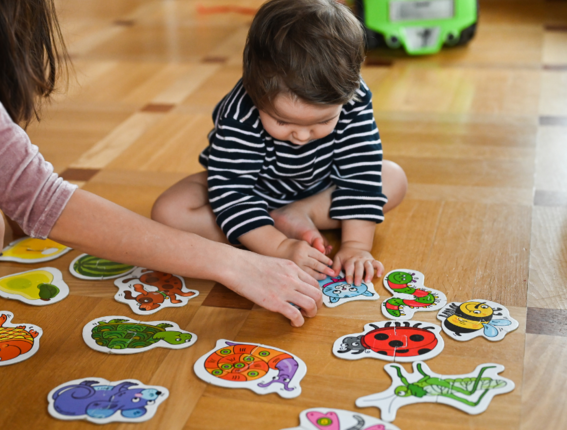The Brazelton Method: the touchpoints approach to help families
What is the Brazelton method?
The Brazelton Method is a revolutionary approach in the field of pediatrics and child development, studied and created since the mid-1950s by Professor T. Berry Brazelton. This method is based on observation and understanding of newborns and their development, with the aim of helping parents to better understand their baby boy or girl and their role. This approach recognizes the presence of possible moments of disorganization in the child's behavior, for physiological reasons and at predictable ages, in the first thousand days of life, when in a concentrated period of time the child makes great progress.
The principles of the Brazelton Method are the basis of the “With the families” project of the Valter Baldaccini Foundation; let's see below why these concepts are so important to us and how the Brazelton approach translates concretely into project development.
The fundamental principles of the Brazelton method
The Brazelton method is recognized for its profound understanding of child development and the family context, a truly innovative idea for its time. Indeed, the dominant theories in pediatrics and developmental psychology until then tended to emphasize the more general and universal aspects of child development, often neglecting the uniqueness of each child and the importance of early parent-child interactions.
Dr. T. Berry Brazelton revolutionized pediatrics and the psychology of child development, shifting the paradigm from a more static and universal vision of the child to a more dynamic, individualized, and relational understanding.
His method is based on three fundamental pillars: understanding the child's developmental stages, recognizing the uniqueness of each family, and promoting a solid support network.
Understanding the developmental stages of the child
The Brazelton Method recognizes that each child goes through specific developmental stages, each with its own characteristics, challenges, and opportunities. These stages, called "Touchpoints", are critical times when children show significant leaps in physical, emotional, social, and cognitive growth. Brazelton highlighted how, during these periods, children may appear temporarily disorganized or regress in some skills, which can create anxiety and uncertainty in parents. Understanding these Touchpoints helps those who care for the child to correctly interpret her behaviors, facilitating more targeted and effective support.
Recognition of the uniqueness of each family
Another pillar of the Brazelton Method is the affirmation that every family is unique, with its own history, culture, values, and dynamics. Brazelton argued that support interventions should be tailored to respect and enhance this uniqueness, rather than applying a uniform approach. This cultural and individual sensitivity promotes care practices that are more welcoming and effective, strengthening the bond between parents and children and between families and the professionals who support them.
Fostering a strong support network
The Brazelton Method emphasizes the importance of building and maintaining a strong support network around children and families. This not only includes direct support for parents and children through educational and therapeutic interventions, but also connecting families with community resources and services that can support their long-term well-being. Brazelton highlighted how social isolation can have negative impacts on children's development and parents' well-being, while an active supportive community can provide essential resources, learning opportunities and a sense of belonging.
What are Brazelton touchpoints?
Brazelton's "touchpoints", also called "sensitive moments" or "pivot points" are crucial developmental moments in which the child's behavior becomes disorganized and in which, consequently, even parents can feel disoriented in their educational tasks and of care.
Touchpoint moments are accompanied by what may appear, in the eyes of parents, to be regressions, that is, temporary moments in which children appear as if they are losing previously acquired skills or displaying behaviors that are more childish for their age. These regressions are signs that the child is going through intense learning and adaptation, which can temporarily overload his coping skills, leading him to fall back on more familiar and reassuring behaviors.
These moments of regression, which Brazelton calls "of disorganization", are predictable moments that precede a leap in behavioral, motor, cognitive and emotional development and constitute a period of reorganization before the maturational leap. Brazelton proposes them as an opportunity for the growth of the child-parent system and as an opportunity for healthcare workers and educators to promote health and prevent possible relational distortions.
Parenting support with the Brazelton method
Parenting support is a central element of the Brazelton Method, which aims to strengthen the relationship between parents and children from the first days of the child's life by recognizing and enhancing the resources of the family and connecting them to those of the territory. The goal is to provide parents with the tools, knowledge, skills, and resources necessary to successfully navigate the challenges of parenting, while promoting the healthy development and well-being of their children.
At the heart of the Valter Baldaccini Foundation’s "With the families" project, the emphasis is placed on the crucial importance of supporting the parenting of the most fragile and vulnerable families, to support not only newborn children, but also to offer targeted accompaniment to parents and the entire family unit, including the vast network of relationships that surround the little ones, at this fundamental moment in their lives. Our educators visit the families included in the project weekly and, through constant and personalized support, are dedicated to strengthening the parent-child relationship, putting into practice the principles of the Brazelton Method.
Since its launch in February 2019, the project has already supported 32 families in difficulty in the area with boys or girls under 12 months. Joining the project is voluntary and the family has an active role: together they define the objectives to work on during the time they will spend together.
Support the “With the families” project! Donate now, as even a small gesture is fundamental to guarantee the best possible start for many girls and boys born in contexts of fragility and vulnerability.
LEARN MORE ABOUT THE PROJECT

